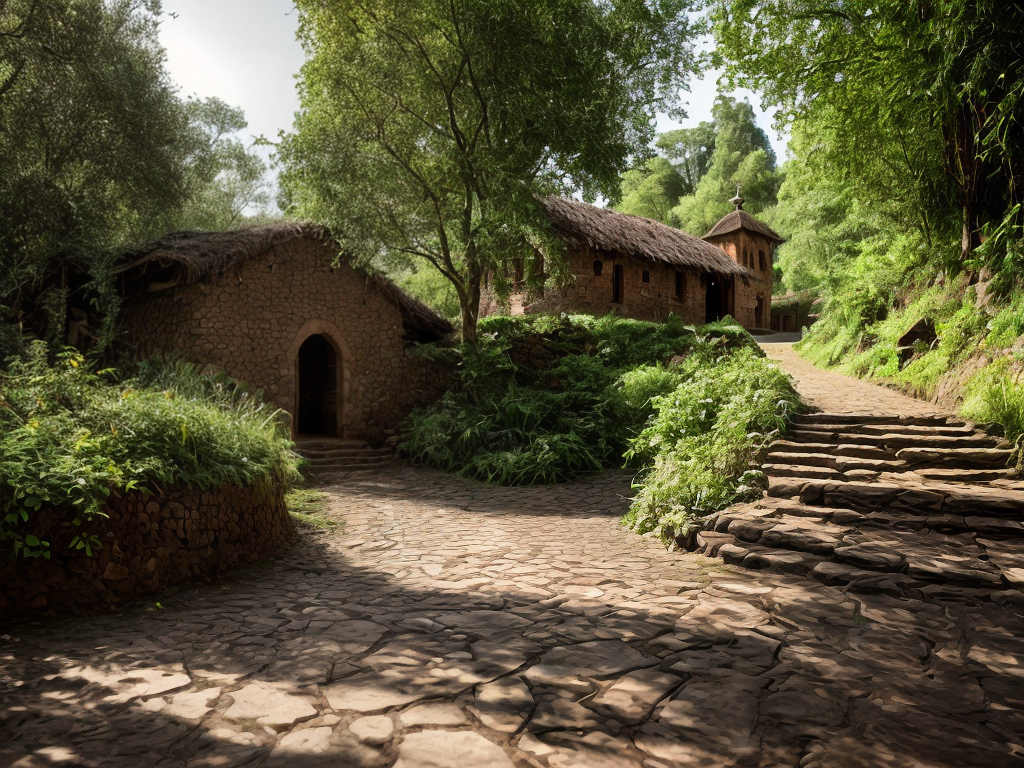As I sipped on a cup of rich, aromatic Ethiopian coffee, I couldn’t help but be struck by the metaphor it provided for the Mountain View Hotel. Nestled amidst the breathtaking landscapes of Ethiopia, this hotel truly embodies the essence of the country’s vibrant and diverse heritage. From its stunning architectural marvels that pay homage to the country’s ancient traditions, to the authentic cuisine that tantalizes the taste buds, and the mesmerizing traditional music and dance performances that transport you to another time, the Mountain View Hotel is a true celebration of Ethiopian culture. But its commitment to preserving and promoting local heritage goes beyond the surface, with art and craft exhibitions showcasing the talents of local artisans, the conservation of indigenous plant and animal species, and sustainable tourism initiatives that support local communities. Join me as we explore the many facets of this remarkable hotel and uncover the beauty and richness of Ethiopian heritage.
Location and Surroundings
Nestled in the heart of the Ethiopian highlands, the Mountain View Hotel offers guests a breathtaking location and picturesque surroundings. The hotel’s proximity to the local transportation hubs allows visitors to easily explore the vibrant local markets and immerse themselves in the rich Ethiopian culture.
The hotel’s strategic location makes it an ideal starting point for exploring the vibrant local markets of Ethiopia. Guests can hop on a local bus or hire a taxi to visit the nearby markets, where they can experience the hustle and bustle of daily life and marvel at the array of unique products on offer. From colorful textiles and traditional crafts to fresh produce and spices, these markets offer a true glimpse into the local way of life.
For those seeking a more authentic experience, the hotel also offers guided tours to the local markets, led by knowledgeable and friendly staff who are passionate about showcasing the best of Ethiopian culture. These tours provide guests with insider knowledge about the best places to shop and the opportunity to interact with local artisans and vendors.
After a long day of exploring the local markets, guests can retreat to the serenity of the Mountain View Hotel. Surrounded by lush greenery and breathtaking views of the Ethiopian highlands, the hotel offers a tranquil escape from the hustle and bustle of the city. The well-appointed rooms and attentive staff ensure a comfortable and relaxing stay, allowing guests to recharge and rejuvenate before their next adventure.
Architectural Marvels
As I explore the architectural marvels of the Mountain View Hotel, I am captivated by its unique design elements and the strong cultural influences that are woven into its structure. The hotel’s exterior showcases a harmonious blend of traditional Ethiopian motifs and modern aesthetics, creating a visually striking facade. Inside, the interior design incorporates elements such as colorful handwoven fabrics, intricate woodwork, and traditional artwork, further immersing guests in the rich heritage of Ethiopia.
Unique Design Elements
The Mountain View Hotel showcases a stunning array of unique design elements that captivate guests with their architectural marvels. Here are four design elements that highlight the integration of nature and local materials:
- Living roofs: The hotel’s roofs are covered with lush greenery, seamlessly blending with the surrounding landscape. These living roofs not only enhance the aesthetic appeal but also provide natural insulation, reducing energy consumption.
- Earthy textures: The hotel’s walls are adorned with locally sourced stones and clay, giving a warm and earthy feel to the interiors. These natural materials not only celebrate Ethiopian heritage but also create a cozy and inviting atmosphere.
- Courtyard gardens: The hotel boasts beautiful courtyard gardens filled with native plants and flowers. These serene and peaceful spaces provide guests with an oasis of tranquility, allowing them to connect with nature.
- Open-air corridors: The hotel’s design incorporates open-air corridors that offer breathtaking views of the surrounding mountains and valleys. Guests can enjoy the fresh mountain air while admiring the picturesque landscapes.
The Mountain View Hotel’s unique design elements seamlessly integrate nature and local materials, creating an intimate and immersive experience for guests.
Cultural Influences
Highlighting the rich cultural influences behind the Mountain View Hotel’s architectural marvels, guests are transported into a world where Ethiopian traditions and heritage are brought to life. The hotel’s design pays homage to the country’s rich cultural heritage and celebrates its unique architectural style. By blending traditional Ethiopian elements with modern design techniques, the hotel successfully captures the essence of Ethiopian culture while providing a comfortable and luxurious experience for guests. Cultural preservation is a key aspect of the hotel’s design philosophy, with efforts made to incorporate local materials, craftsmanship, and techniques. This not only ensures the authenticity of the hotel’s aesthetic but also supports local artisans and promotes cultural exchange. The result is a truly immersive experience that allows guests to appreciate and engage with Ethiopia’s vibrant cultural heritage.
Authentic Ethiopian Cuisine
With a rich blend of flavors and spices, the authentic Ethiopian cuisine at Mountain View Hotel takes guests on a culinary journey through the vibrant culture and heritage of Ethiopia. Here are four unique aspects of the hotel’s cuisine that showcase the richness of Ethiopian culinary traditions:
- Traditional Ethiopian Spices: From the fiery berbere to the fragrant mitmita, the use of traditional Ethiopian spices is at the heart of every dish. These spices not only add depth and complexity to the flavors but also reflect the country’s long history of spice trade and influence from neighboring regions.
- Injera – The Ethiopian Staple: Injera, a sourdough flatbread made from teff flour, is a staple in Ethiopian cuisine. It serves as both a utensil and a base for various dishes. Its tangy flavor and spongy texture perfectly complement the bold flavors of the cuisine, making every bite a delight.
- The Ethiopian Coffee Ceremony: The Mountain View Hotel offers the traditional Ethiopian coffee ceremony, a symbol of hospitality and a deeply ingrained cultural tradition. Guests are invited to partake in the process of roasting, grinding, and brewing the coffee, while enjoying the rich aroma and warm conversations that accompany this time-honored ritual.
- Vegetarian Delights: Ethiopian cuisine is known for its diverse vegetarian options. From lentil stews to vegetable curries, the hotel’s menu offers a wide range of flavorful and satisfying plant-based dishes. These vegetarian delights not only cater to the preferences of guests but also highlight the importance of plant-based ingredients in Ethiopian cuisine.
At Mountain View Hotel, the authentic Ethiopian cuisine not only satisfies the taste buds but also provides a glimpse into the rich cultural heritage of Ethiopia. Each dish tells a story, inviting guests to immerse themselves in the flavors and traditions of this vibrant country.
Traditional Music and Dance
Immerse yourself in the vibrant cultural traditions of Ethiopia with the captivating rhythms and movements of traditional music and dance at Mountain View Hotel. The hotel takes great pride in showcasing the rich musical heritage of the country, providing guests with an authentic and intimate experience.
Traditional music in Ethiopia is deeply rooted in its history and culture. It is characterized by the use of traditional instruments such as the masinko, a single-stringed bowed instrument, and the krar, a five- or six-stringed lyre. These instruments produce unique and melodious sounds that transport listeners to another time and place. At Mountain View Hotel, you can witness skilled musicians playing these traditional instruments, creating an atmosphere that is both enchanting and immersive.
In addition to the music, traditional dance performances are a highlight of the cultural experience at the hotel. Ethiopian dance is characterized by its energetic movements, intricate footwork, and vibrant costumes. The dancers effortlessly synchronize their steps to the rhythm of the music, creating a mesmerizing spectacle that leaves audiences in awe. These performances not only entertain but also provide a glimpse into the rich cultural heritage of Ethiopia.
At Mountain View Hotel, the traditional music and dance performances are carefully curated to provide an authentic experience for guests. Whether you are a music enthusiast or simply curious about Ethiopian culture, the captivating rhythms and movements of traditional music and dance will leave a lasting impression. Immerse yourself in this unique cultural experience and let the vibrant traditions of Ethiopia come alive at Mountain View Hotel.
Art and Craft Exhibitions
One can explore the vibrant world of Ethiopian art and crafts through the engaging exhibitions at Mountain View Hotel. These art and craft exhibitions provide a unique opportunity to immerse oneself in the rich cultural heritage of Ethiopia. Here are four fascinating aspects of these exhibitions:
- Traditional Art: The art exhibitions at Mountain View Hotel showcase a wide range of traditional Ethiopian art forms, including paintings, sculptures, and textiles. Visitors can marvel at the intricate details and vibrant colors of these artworks, each telling a unique story of Ethiopian culture and history.
- Contemporary Crafts: Alongside traditional art, the exhibitions also feature contemporary crafts created by local artisans. From intricately woven baskets and pottery to handmade jewelry and leatherwork, these crafts highlight the skill and creativity of Ethiopian artisans today.
- Local Festivals and Celebrations: The art and craft exhibitions often highlight the role of art in local festivals and celebrations. Visitors can learn about the significance of art and crafts in various Ethiopian festivals, such as Timket (Epiphany) and Meskel (Finding of the True Cross). Through these exhibitions, one can gain a deeper understanding of the cultural significance of these events.
- Interactive Workshops: In addition to viewing the exhibitions, visitors have the opportunity to participate in interactive workshops led by local artists and craftsmen. These workshops provide hands-on experiences, allowing visitors to learn traditional art techniques and create their own unique pieces under the guidance of skilled artisans.
The art and craft exhibitions at Mountain View Hotel offer a glimpse into the vibrant world of Ethiopian artistry and provide an intimate and immersive experience for visitors. Whether you are an art enthusiast or simply curious about Ethiopian culture, these exhibitions are sure to leave a lasting impression.
Local Festivals and Celebrations
The art and craft exhibitions at Mountain View Hotel shed light on the significance of art in local festivals and celebrations in Ethiopia. These festivals are an essential part of Ethiopian culture, showcasing the vibrant traditions and rich heritage of the country. One of the highlights of these celebrations is the local music scene, which plays a central role in creating a festive atmosphere.
Ethiopia has a diverse and thriving music culture, with each region having its own unique style and instruments. Local festivals provide a platform for musicians to showcase their talent and entertain the crowd. From traditional instruments like the masinko and krar to modern interpretations of Ethiopian music, the local music scene captivates audiences and adds an extra layer of excitement to the festivities.
In addition to music, traditional dance forms are also an integral part of local festivals and celebrations. These dances, passed down through generations, embody the spirit and history of the Ethiopian people. The movements, costumes, and rhythm of the dances reflect the cultural diversity and unity of the country. Whether it’s the energetic and fast-paced Eskista dance or the graceful and elegant Amhara dance, each performance tells a story and creates a sense of connection among the participants and spectators.
Attending a local festival in Ethiopia is a sensory experience that immerses you in the country’s vibrant culture. From the rhythmic beats of the music to the mesmerizing movements of the dancers, you can’t help but feel a part of something special. The Mountain View Hotel celebrates these local festivals and their significance by showcasing the art forms that bring them to life. It is a place where guests can not only learn about Ethiopian heritage but also feel the warmth and joy of the local celebrations.
Cultural Workshops and Classes
Guests at Mountain View Hotel have the opportunity to participate in cultural workshops and classes that offer a hands-on experience of Ethiopian traditions and arts. Here are four exciting activities that allow guests to immerse themselves in the vibrant culture of Ethiopia:
- Cultural Dance Performances: Guests can witness captivating cultural dance performances that showcase the rich diversity of Ethiopian traditional dances. From the energetic shoulder-shaking Eskista to the graceful movements of the Amhara dance, these performances provide an authentic glimpse into the country’s cultural heritage.
- Traditional Arts and Crafts: In these workshops, guests can learn the ancient techniques of Ethiopian arts and crafts. From intricate embroidery to pottery making, participants will have the chance to create their own unique pieces under the guidance of skilled local artisans. This hands-on experience allows for a deeper understanding and appreciation of Ethiopia’s artistic traditions.
- Coffee Ceremony Workshops: Ethiopia is often referred to as the birthplace of coffee, and guests can learn the art of the traditional Ethiopian coffee ceremony. From roasting the beans over an open fire to brewing a rich and aromatic cup, participants will gain insight into the cultural significance of coffee in Ethiopian society.
- Cooking Classes: Ethiopian cuisine is renowned for its bold flavors and unique cooking techniques. In these culinary classes, guests can learn how to prepare traditional Ethiopian dishes such as injera, doro wat, and kitfo. Under the guidance of experienced Ethiopian chefs, participants will explore the vibrant spices and ingredients that make Ethiopian cuisine so distinctive.
These cultural workshops and classes provide guests with an intimate and immersive experience of Ethiopian heritage. Whether through dance performances, traditional arts and crafts, coffee ceremonies, or cooking classes, participants will leave with a deeper understanding and appreciation of Ethiopia’s rich cultural traditions.
Traditional Clothing and Accessories
As I explore the rich cultural heritage of Ethiopia, one aspect that stands out is the traditional clothing and accessories worn by its people. The vibrant colors, intricate patterns, and beautiful craftsmanship of the cultural attire and jewelry reflect the country’s diverse ethnic groups and their unique traditions. These traditional garments hold great significance, often representing the wearer’s social status, tribe, or even marital status.
Cultural Attire and Jewelry
Ethiopian cultural attire and jewelry, with their vibrant colors and intricate designs, beautifully showcase the rich heritage and traditions of the country. When it comes to cultural fashion trends, Ethiopia is known for its unique and diverse traditional clothing and accessories. Here are four items that epitomize Ethiopian cultural attire and jewelry:
- Habesha Kemis: This traditional Ethiopian dress is made from handwoven fabric and features exquisite embroidery. It is usually worn by women for special occasions.
- Meskel Dembi: This gold cross necklace holds great religious significance in Ethiopian Orthodox Christianity. It is worn by both men and women as a symbol of faith and protection.
- Tilet: These colorful scarves are worn by Ethiopian women as head wraps or shawls. They add a touch of elegance and tradition to any outfit.
- Bangle bracelets: Made from gold, silver, or brass, these bracelets are often worn by Ethiopian women as a symbol of femininity and beauty.
With their cultural significance and aesthetic appeal, Ethiopian cultural attire and jewelry are a true reflection of the country’s rich heritage.
Significance of Traditional Garments
Traditional garments in Ethiopia hold deep cultural significance, representing the rich history and heritage of the country. These garments are not only a form of self-expression but also a way to preserve and honor traditional values. Traditional clothing in Ethiopia is known for its vibrant colors, intricate patterns, and use of natural materials like cotton and silk. It reflects the diverse ethnic groups and regions of the country, with each group having its own unique style. Traditional garments are not just worn for special occasions but also for everyday wear, showing the importance of cultural fashion trends in Ethiopian society. To showcase the beauty and value of these garments, efforts are being made to preserve traditional weaving techniques and encourage the younger generation to embrace their cultural heritage.
| Traditional Garment Preservation | Cultural Fashion Trends |
|---|---|
| Efforts to preserve traditional weaving techniques and designs. | Embracing traditional garments as a fashion statement. |
| Promoting the use of natural materials like cotton and silk. | Incorporating traditional patterns and colors in modern clothing. |
| Encouraging the younger generation to learn and appreciate traditional garment making. | Showcasing traditional garments on international runways. |
| Establishing museums and cultural centers to educate people about traditional clothing. | Collaborating with local designers to create modern interpretations of traditional garments. |
| Recognizing the role of traditional garments in preserving cultural identity. | Celebrating the diversity and beauty of traditional clothing in Ethiopia. |
Historical Landmarks Nearby
Located in the vibrant city of Addis Ababa, the Mountain View Hotel offers a convenient base for exploring the rich historical landmarks nearby. Here are four notable historical sites that showcase the city’s historical preservation and cultural heritage:
- National Museum of Ethiopia: As the most renowned museum in the country, the National Museum of Ethiopia houses a remarkable collection of artifacts and relics that span thousands of years. Visitors can marvel at the famous Lucy skeleton, which provides invaluable insights into early human evolution.
- Holy Trinity Cathedral: A symbol of Ethiopian Orthodox Christianity, the Holy Trinity Cathedral is a majestic architectural masterpiece. With its stunning stained glass windows and intricate carvings, the cathedral is a testament to the country’s deep-rooted religious traditions.
- Menelik’s Imperial Palace: Once the residence of Emperor Menelik II, this historical landmark offers a glimpse into Ethiopia’s imperial past. Visitors can explore beautifully furnished rooms, stunning gardens, and learn about the life and legacy of one of the country’s most beloved rulers.
- Addis Ababa Museum: Located in the historic district of Piazza, the Addis Ababa Museum provides a comprehensive overview of the city’s history and development. From ancient artifacts to modern artworks, the museum offers a compelling narrative of Addis Ababa’s cultural heritage and its journey towards becoming a vibrant metropolis.
These historical landmarks offer an opportunity to immerse oneself in Ethiopia’s rich history and cultural heritage. Whether you are a history enthusiast or simply curious about the country’s past, exploring these sites will undoubtedly deepen your understanding and appreciation of Addis Ababa’s unique identity.
Local Language and Communication
As a traveler staying at the Mountain View Hotel, I was delighted to discover the language immersion activities and cultural communication workshops offered to guests. These experiences provide a unique opportunity to engage with the local community and learn more about Ethiopian heritage. By actively participating in these activities, guests can develop a deeper understanding of the local language and enhance their overall cultural experience during their stay at the hotel.
Language Immersion Activities
To fully immerse guests in the rich cultural heritage of Ethiopia, the Mountain View Hotel offers language immersion activities that allow visitors to engage with the local language and enhance their communication skills. Here are four language immersion activities at the hotel:
- Language Classes: Guests can participate in interactive language learning sessions led by experienced local instructors. These classes cover basic greetings, expressions, and essential vocabulary.
- Cultural Exchange Events: The hotel organizes regular cultural exchange events where guests can interact with local community members. These events provide a unique opportunity to practice the language while learning about Ethiopian traditions, customs, and way of life.
- Language Practice Sessions: The hotel offers language practice sessions where guests can engage in conversations with native speakers. These informal sessions create a relaxed and supportive environment for guests to practice their language skills.
- Guided Language Tours: Guests can join guided language tours to explore the local area while practicing their language skills. These tours provide an immersive experience, allowing guests to interact with locals and learn about the region’s history, landmarks, and culture.
Through these language immersion activities, guests can deepen their understanding of Ethiopian culture, forge meaningful connections, and develop their language proficiency in an authentic and enjoyable way.
Cultural Communication Workshops
The Mountain View Hotel offers cultural communication workshops that focus on local language and communication, providing guests with valuable skills for engaging with the Ethiopian community. These workshops are an integral part of the hotel’s commitment to promoting cultural exchange programs and fostering cross-cultural understanding. Through these workshops, guests have the opportunity to learn key phrases and expressions in the local language, allowing them to communicate effectively with locals and immerse themselves in the vibrant Ethiopian culture. The workshops also cover important aspects of Ethiopian communication styles and customs, enabling guests to navigate social situations with ease and respect. By participating in these cultural communication workshops, guests not only gain practical language skills but also develop a deeper appreciation and understanding of the rich heritage and traditions of Ethiopia.
Traditional Healing and Wellness Practices
Traditional healing and wellness practices in Ethiopia have long been revered for their effectiveness and holistic approach to well-being. As a country deeply rooted in ancient traditions and cultural heritage, Ethiopia offers a rich tapestry of traditional healing practices that are deeply intertwined with its people’s daily lives. Here are four traditional healing and wellness practices that you can experience during a wellness retreat in Ethiopia:
- Herbal Medicine: Ethiopian traditional healers, known as “dukem” or “qessie,” utilize a wide range of indigenous herbs and plants to treat various ailments. From the soothing effects of chamomile tea to the healing properties of ginger and garlic, herbal medicine plays a significant role in promoting wellness and restoring balance in the body.
- Traditional Massage: Ethiopian traditional massage, known as “guzay,” incorporates rhythmic movements, gentle stretches, and the use of aromatic oils to relax the body and relieve muscle tension. This therapeutic practice not only rejuvenates the body but also promotes a sense of tranquility and inner peace.
- Cupping Therapy: Cupping therapy, known as “tej bet,” involves placing heated cups on specific areas of the body to create suction. This practice is believed to stimulate blood circulation, alleviate pain, and promote detoxification. Cupping therapy is commonly used to treat musculoskeletal conditions and promote overall well-being.
- Energy Healing: Ethiopian traditional healers believe in the existence of a life force energy called “sizigia.” Energy healing techniques, such as “qigong” and “reiki,” are used to balance and harmonize this energy within the body, promoting physical, emotional, and spiritual well-being.
Indigenous Plant and Animal Species
Ethiopia boasts a diverse array of indigenous plant and animal species, showcasing the country’s rich biodiversity. The preservation of these unique species is essential for maintaining the delicate balance of our ecosystems and ensuring their survival for future generations. Endangered species conservation plays a crucial role in protecting Ethiopia’s natural heritage, and ecotourism opportunities provide a sustainable way to promote awareness and appreciation for these remarkable creatures.
One of the most notable endangered species in Ethiopia is the Ethiopian wolf (Canis simensis). This beautiful canid is the rarest canid species in the world and is found only in the Ethiopian highlands. Efforts are being made to protect their habitat and mitigate threats such as habitat loss and disease. Visitors to Ethiopia can contribute to these conservation efforts by supporting ecotourism activities that focus on observing and learning about these fascinating animals in their natural habitat.
Another unique species that calls Ethiopia home is the Gelada baboon (Theropithecus gelada). Known for their distinctive red chest patches and impressive social structure, Gelada baboons are a sight to behold. Their conservation is critical to maintaining the ecological balance of the Ethiopian highlands. Ecotourism initiatives allow visitors to witness these incredible primates up close while contributing to their protection.
Ethiopia’s indigenous plant species are equally remarkable. From the towering Abyssinian highland bamboo to the vibrant Ethiopian rose (Rosa abyssinica), the country is a botanical treasure trove. The conservation of these plants is vital not only for their intrinsic value but also for the benefits they provide, such as medicinal properties and ecosystem services.
Ethiopian Coffee Culture
As an integral part of Ethiopian culture, coffee plays a significant role in daily life and social gatherings. Traditional Ethiopian brews are known for their rich flavors and unique preparation methods, often involving a coffee ceremony that is steeped in tradition and hospitality. From roasting the beans to serving the final cup, these rituals highlight the importance of coffee in Ethiopian society and showcase the country’s deep-rooted coffee culture.
Traditional Ethiopian Brews
Nestled within the lush landscapes of Ethiopia, the vibrant aroma of freshly brewed coffee fills the air at the Mountain View Hotel, offering guests a taste of the rich Ethiopian coffee culture. Here, traditional Ethiopian brews are meticulously prepared, providing an authentic experience that immerses visitors in the country’s coffee heritage. To paint a picture for you, imagine:
- The mesmerizing sight of Ethiopian coffee beans being roasted over an open flame, releasing their enticing aromas.
- Skilled baristas skillfully grinding and brewing the coffee using traditional Ethiopian methods, such as the Jebena pot.
- The sensory delight of sipping on a freshly brewed cup of Ethiopian coffee, with its bold flavors and unique profiles.
- Engaging in cultural workshops and classes, where you can learn about the history, rituals, and significance of Ethiopian coffee in the local culture.
At Mountain View Hotel, every sip is an invitation to explore Ethiopia’s deep-rooted coffee traditions.
Coffee Ceremony Rituals
Immerse yourself in the captivating traditions of Ethiopian coffee culture through the mesmerizing rituals of the Coffee Ceremony at the Mountain View Hotel. The Ethiopian coffee ceremony is a time-honored tradition that holds great cultural significance. It is not just about the coffee itself, but also about the process and the social aspect of gathering together. The ceremony begins with the washing and roasting of the coffee beans, filling the air with a rich aroma. The freshly roasted beans are then ground and brewed in a traditional clay pot called a jebena. The host pours the coffee into small cups, serving it with an offering of popcorn or snacks. As a guest, it is important to follow the coffee ceremony etiquette, such as accepting the first cup even if you don’t want it and engaging in conversation while enjoying the coffee. The ceremony fosters a sense of community, and it is a time to connect, relax, and appreciate the cultural significance of coffee in Ethiopian society.
Sustainable Tourism Initiatives
Sustainable tourism initiatives at Mountain View Hotel prioritize the preservation and promotion of Ethiopian heritage. Here are four key ways in which the hotel actively engages with the local community and implements eco-friendly practices:
- Community Engagement: Mountain View Hotel actively involves the local community in its operations. We collaborate with local artisans, craftsmen, and farmers to source materials and products for the hotel. By doing so, we support local businesses and preserve traditional Ethiopian craftsmanship. Additionally, we provide employment opportunities to the community, ensuring that they benefit from tourism in a meaningful way.
- Conservation and Environmental Practices: We are committed to minimizing our environmental impact. Mountain View Hotel has implemented various eco-friendly practices such as energy-efficient lighting, water conservation measures, and waste management systems. We prioritize sustainability in our daily operations and strive to reduce our carbon footprint.
- Cultural Preservation: Ethiopian heritage is rich and diverse, and we believe in preserving and promoting it. Mountain View Hotel showcases traditional Ethiopian art, music, and dance performances for our guests. We also offer workshops and cultural experiences where visitors can learn about Ethiopian traditions, such as traditional cooking classes and coffee ceremonies.
- Supporting Local Causes: We actively contribute to local philanthropic initiatives. Mountain View Hotel partners with local organizations to support education, healthcare, and environmental conservation projects. We believe in giving back to the community that has welcomed us and sharing the benefits of tourism with those in need.
Through these sustainable tourism initiatives, Mountain View Hotel strives to not only provide guests with a memorable experience but also to positively impact the local community and preserve Ethiopia’s rich heritage for future generations.
Supporting Local Communities
Building on our commitment to sustainable tourism initiatives, Mountain View Hotel actively supports and uplifts local communities in Ethiopia. We believe that community development and local entrepreneurship are essential for the sustainable growth and prosperity of the region.
One way we support local communities is by sourcing the majority of our supplies and products from local businesses. By doing this, we not only promote local entrepreneurship but also contribute to the economic development of the surrounding communities. We prioritize working with local farmers and artisans, ensuring that they receive fair compensation for their goods and services.
In addition to supporting local businesses, we also invest in community development projects. We collaborate with local organizations to implement initiatives that address the needs and aspirations of the community. These projects focus on areas such as education, healthcare, and infrastructure development. By actively engaging with the community, we aim to create sustainable and long-lasting positive impacts.
Moreover, we provide training and employment opportunities for local residents. We believe that by empowering individuals with the necessary skills and knowledge, we can help them achieve economic independence and improve their quality of life. Our staff consists primarily of locals, who bring their unique perspectives and experiences, further enriching the guest experience.
At Mountain View Hotel, we are committed to creating a positive and meaningful impact on the local communities we operate in. Through our support for local businesses, community development projects, and employment opportunities, we strive to contribute to the growth and prosperity of Ethiopia. We believe that by working hand-in-hand with the community, we can create a sustainable future for all.







